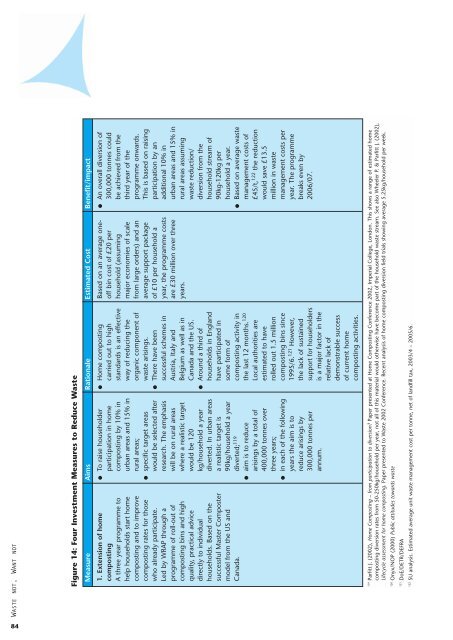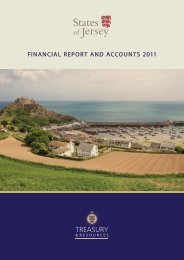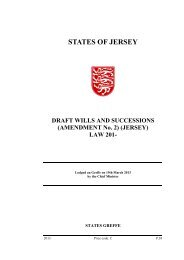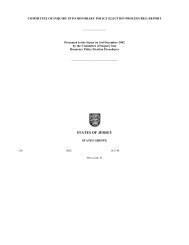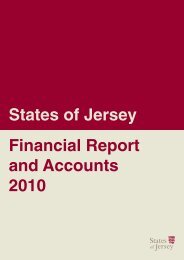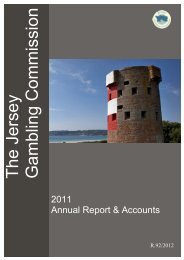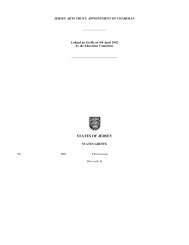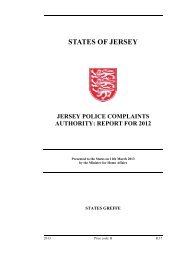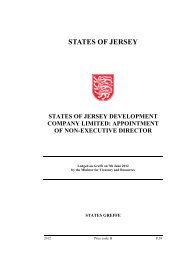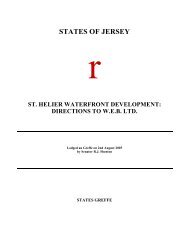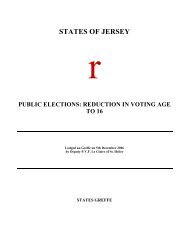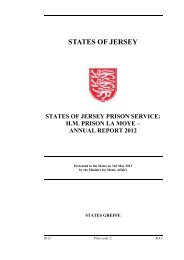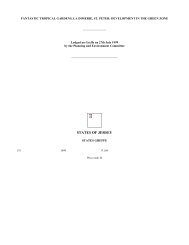Waste not want not - States Assembly
Waste not want not - States Assembly
Waste not want not - States Assembly
You also want an ePaper? Increase the reach of your titles
YUMPU automatically turns print PDFs into web optimized ePapers that Google loves.
WASTE NOT, WANT NOT<br />
Figure 14: Four Investment Measures to Reduce <strong>Waste</strong><br />
Measure Aims Rationale Estimated Cost Benefit/impact<br />
1. Extension of home<br />
composting<br />
A three year programme to<br />
help households start home<br />
composting and to improve<br />
composting rates for those<br />
who already participate.<br />
Led by WRAP through a<br />
programme of roll-out of<br />
composting bins and high<br />
quality, practical advice<br />
directly to individual<br />
households. Based on the<br />
successful Master Composter<br />
model from the US and<br />
Canada.<br />
● To raise householder<br />
participation in home<br />
composting by 10% in<br />
urban areas and 15% in<br />
rural areas;<br />
● specific target areas<br />
would be selected after<br />
research. The emphasis<br />
will be on rural areas<br />
where a realistic target<br />
would be 120<br />
kg/household a year<br />
diverted. In urban areas<br />
a realistic target is<br />
90kg/household a year<br />
diverted; 119<br />
● aim is to reduce<br />
arisings by a total of<br />
400,000 tonnes over<br />
three years;<br />
● in each of the following<br />
years the aim is to<br />
reduce arisings by<br />
300,000 tonnes per<br />
annum.<br />
● Home composting<br />
carried out to high<br />
standards is an effective<br />
way of reducing the<br />
organic component of<br />
waste arisings.<br />
● There have been<br />
successful schemes in<br />
Austria, Italy and<br />
Belgium as well as in<br />
Canada and the US.<br />
● Around a third of<br />
households in England<br />
have participated in<br />
some form of<br />
composting activity in<br />
the last 12 months. 120<br />
Local authorities are<br />
estimated to have<br />
rolled out 1.5 million<br />
composting bins since<br />
1995/6. 121 However,<br />
the lack of sustained<br />
support for householders<br />
is a major factor in the<br />
relative lack of<br />
demonstrable success<br />
of current home<br />
composting activities.<br />
Based on an average oneoff<br />
bin cost of £20 per<br />
household (assuming<br />
major economies of scale<br />
from large orders) and an<br />
average support package<br />
of £10 per household a<br />
year, the programme costs<br />
are £30 million over three<br />
years.<br />
● An overall diversion of<br />
300,000 tonnes could<br />
be achieved from the<br />
third year of the<br />
programme onwards.<br />
This is based on raising<br />
participation by an<br />
additional 10% in<br />
urban areas and 15% in<br />
rural areas assuming<br />
waste reduction/<br />
diversion from the<br />
household stream of<br />
90kg-120kg per<br />
household a year.<br />
● Based on average waste<br />
management costs of<br />
£45/t, 122 the reduction<br />
would save £13.5<br />
million in waste<br />
management costs per<br />
year. The programme<br />
breaks even by<br />
2006/07.<br />
119<br />
Parfitt J. (2002), Home Composting – from participation to diversion? Paper presented at Home Composting Conference 2002, Imperial College, London. This shows a range of estimated home<br />
composting diversion rates from 50-250kg/household per year, <strong>not</strong> all of this material would otherwise have become part of the household waste stream. See also Wheeler P. & Parfitt J. (2002),<br />
Lifecycle assessment for home composting. Paper presented to <strong>Waste</strong> 2002 Conference. Recent analysis of home composting diversion field trials showing average 5.25kg/household per week.<br />
120<br />
Onyx/NOP (2000) Public attitudes towards waste<br />
121<br />
DoE/DETR/DEFRA<br />
122<br />
SU analysis. Estimated average unit waste management cost per tonne, net of landfill tax, 2003/4 – 2005/6.<br />
84


